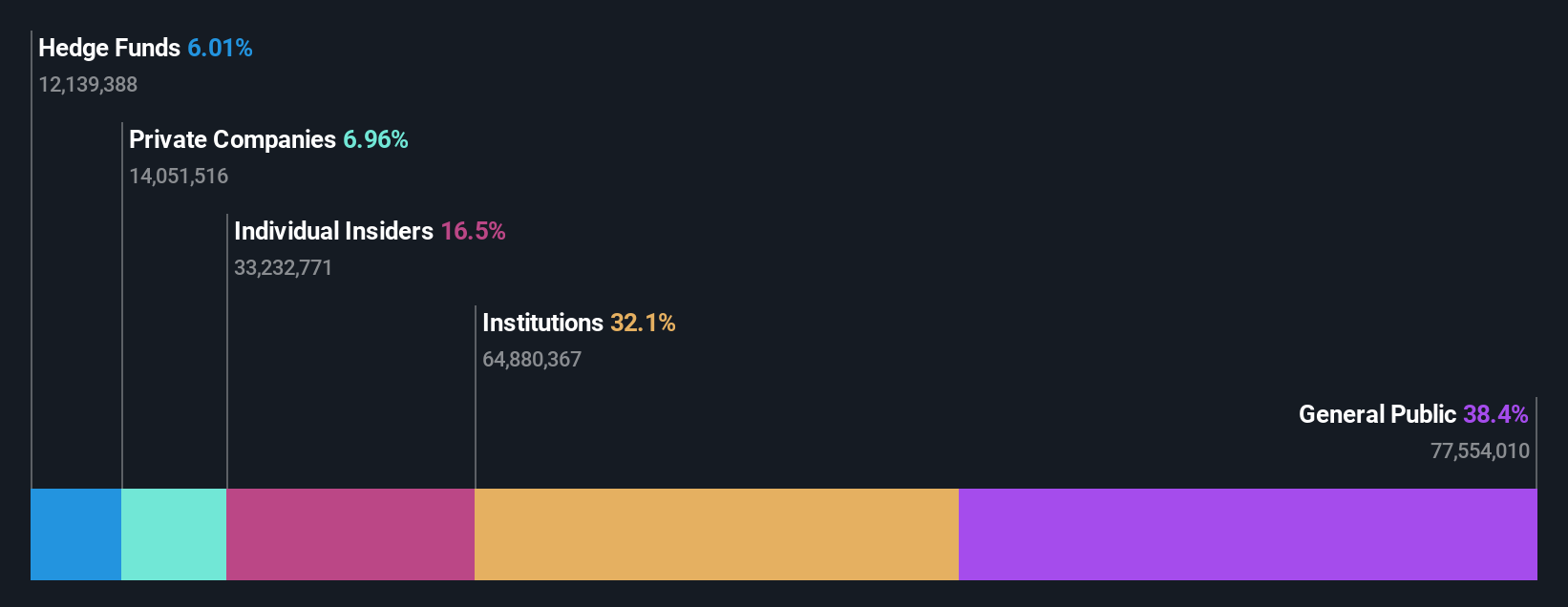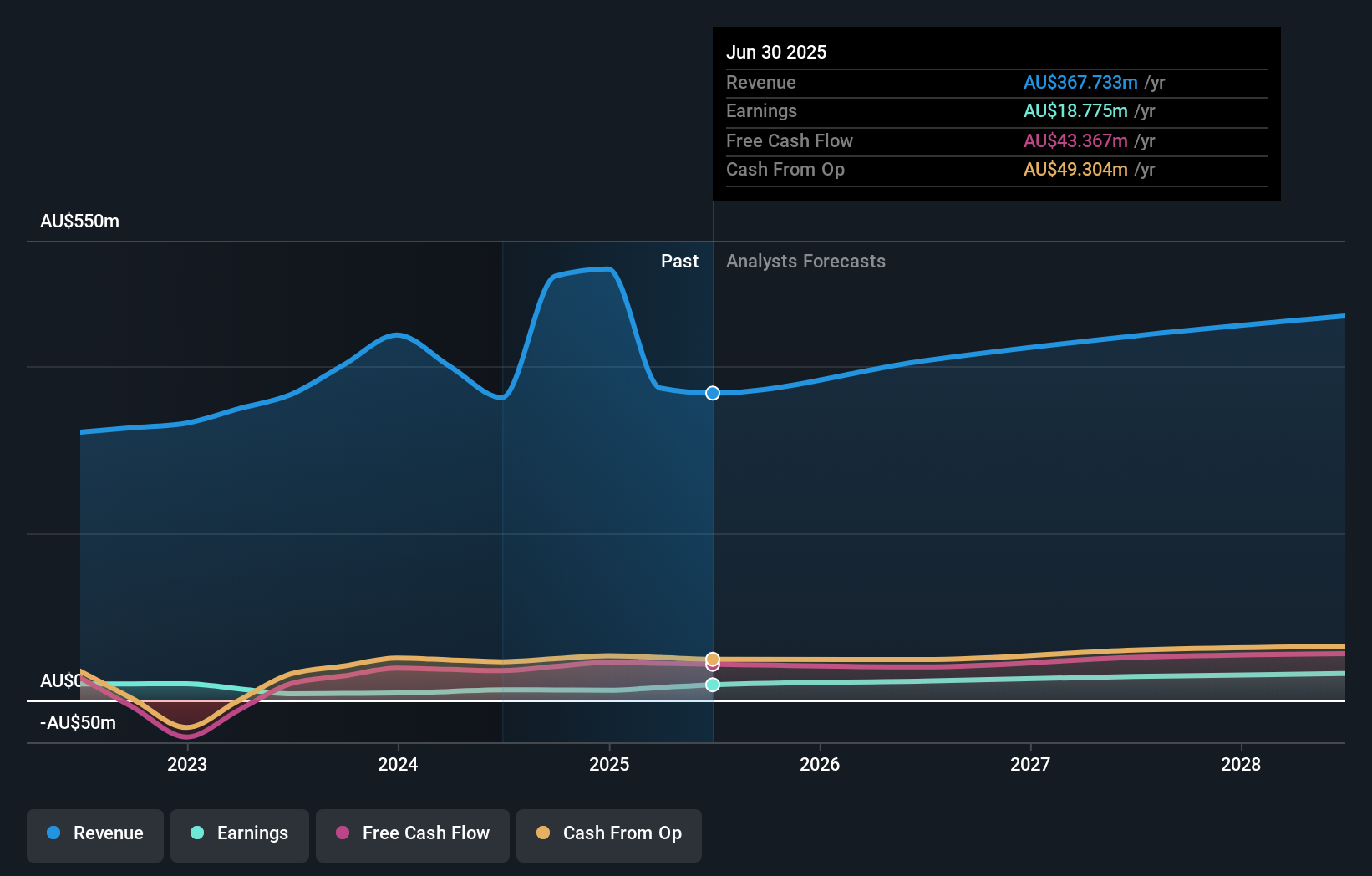- Australia
- /
- Capital Markets
- /
- ASX:COG
COG Financial Services Limited's (ASX:COG) 11% loss last week hit both individual investors who own 38% as well as institutions
Key Insights
- COG Financial Services' significant individual investors ownership suggests that the key decisions are influenced by shareholders from the larger public
- A total of 12 investors have a majority stake in the company with 51% ownership
- Insiders have bought recently
If you want to know who really controls COG Financial Services Limited (ASX:COG), then you'll have to look at the makeup of its share registry. And the group that holds the biggest piece of the pie are individual investors with 38% ownership. In other words, the group stands to gain the most (or lose the most) from their investment into the company.
Following a 11% decrease in the stock price last week, individual investors suffered the most losses, but institutions who own 32% stock also took a hit.
In the chart below, we zoom in on the different ownership groups of COG Financial Services.
View our latest analysis for COG Financial Services

What Does The Institutional Ownership Tell Us About COG Financial Services?
Many institutions measure their performance against an index that approximates the local market. So they usually pay more attention to companies that are included in major indices.
We can see that COG Financial Services does have institutional investors; and they hold a good portion of the company's stock. This implies the analysts working for those institutions have looked at the stock and they like it. But just like anyone else, they could be wrong. If multiple institutions change their view on a stock at the same time, you could see the share price drop fast. It's therefore worth looking at COG Financial Services' earnings history below. Of course, the future is what really matters.

It would appear that 6.0% of COG Financial Services shares are controlled by hedge funds. That's interesting, because hedge funds can be quite active and activist. Many look for medium term catalysts that will drive the share price higher. Cameron McCullagh is currently the largest shareholder, with 7.3% of shares outstanding. In comparison, the second and third largest shareholders hold about 7.0% and 6.3% of the stock. Furthermore, CEO Andrew Bennett is the owner of 1.1% of the company's shares.
Looking at the shareholder registry, we can see that 51% of the ownership is controlled by the top 12 shareholders, meaning that no single shareholder has a majority interest in the ownership.
While it makes sense to study institutional ownership data for a company, it also makes sense to study analyst sentiments to know which way the wind is blowing. There are plenty of analysts covering the stock, so it might be worth seeing what they are forecasting, too.
Insider Ownership Of COG Financial Services
While the precise definition of an insider can be subjective, almost everyone considers board members to be insiders. The company management answer to the board and the latter should represent the interests of shareholders. Notably, sometimes top-level managers are on the board themselves.
Insider ownership is positive when it signals leadership are thinking like the true owners of the company. However, high insider ownership can also give immense power to a small group within the company. This can be negative in some circumstances.
It seems insiders own a significant proportion of COG Financial Services Limited. Insiders have a AU$70m stake in this AU$424m business. It is great to see insiders so invested in the business. It might be worth checking if those insiders have been buying recently.
General Public Ownership
The general public, who are usually individual investors, hold a 38% stake in COG Financial Services. While this group can't necessarily call the shots, it can certainly have a real influence on how the company is run.
Private Company Ownership
Our data indicates that Private Companies hold 7.0%, of the company's shares. Private companies may be related parties. Sometimes insiders have an interest in a public company through a holding in a private company, rather than in their own capacity as an individual. While it's hard to draw any broad stroke conclusions, it is worth noting as an area for further research.
Next Steps:
While it is well worth considering the different groups that own a company, there are other factors that are even more important. For example, we've discovered 2 warning signs for COG Financial Services (1 doesn't sit too well with us!) that you should be aware of before investing here.
But ultimately it is the future, not the past, that will determine how well the owners of this business will do. Therefore we think it advisable to take a look at this free report showing whether analysts are predicting a brighter future.
NB: Figures in this article are calculated using data from the last twelve months, which refer to the 12-month period ending on the last date of the month the financial statement is dated. This may not be consistent with full year annual report figures.
New: AI Stock Screener & Alerts
Our new AI Stock Screener scans the market every day to uncover opportunities.
• Dividend Powerhouses (3%+ Yield)
• Undervalued Small Caps with Insider Buying
• High growth Tech and AI Companies
Or build your own from over 50 metrics.
Have feedback on this article? Concerned about the content? Get in touch with us directly. Alternatively, email editorial-team (at) simplywallst.com.
This article by Simply Wall St is general in nature. We provide commentary based on historical data and analyst forecasts only using an unbiased methodology and our articles are not intended to be financial advice. It does not constitute a recommendation to buy or sell any stock, and does not take account of your objectives, or your financial situation. We aim to bring you long-term focused analysis driven by fundamental data. Note that our analysis may not factor in the latest price-sensitive company announcements or qualitative material. Simply Wall St has no position in any stocks mentioned.
About ASX:COG
COG Financial Services
Engages in equipment financing and broking, aggregation, insurance broking, and novated leasing activities for in Australia.
Proven track record with moderate growth potential.
Market Insights
Community Narratives



